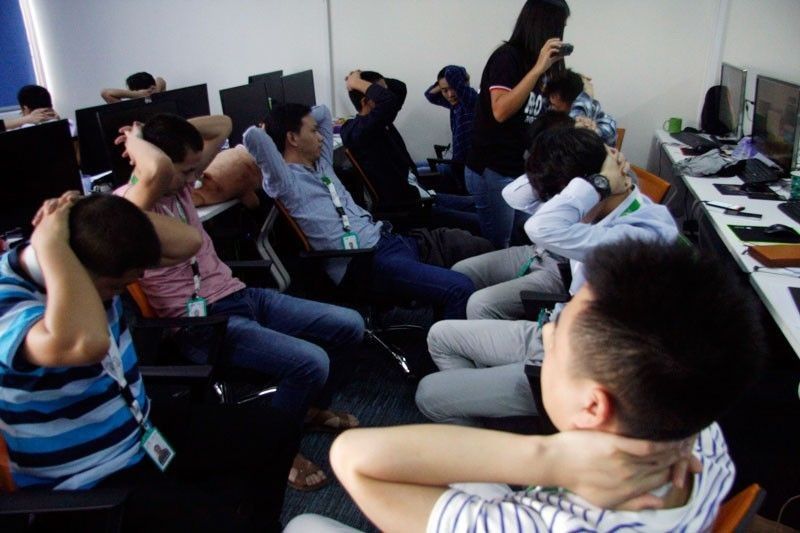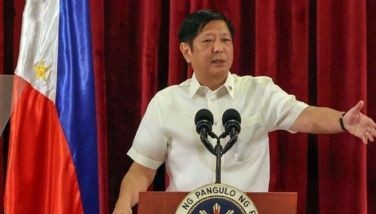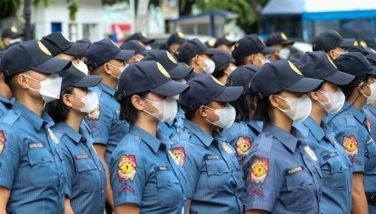Palace: Government to enforce laws on Chinese illegals

MANILA, Philippines — Malacañang clarified yesterday that the government will enforce immigration laws against illegal Chinese workers.
The statement was issued as the Trade Union Congress of the Philippines (TUCP) and other groups stressed the need for government agencies to coordinate in implementing the law related to foreign workers to ensure that Filipinos are not robbed of opportunities in their own country.
Senate President Vicente Sotto III, Sens. Panfilo Lacson and Joel Villanueva, chairman of the committee on labor, employment and human development, also rejected the call of President Duterte to allow Chinese nationals to work here to avoid backlash on more than 300,000 Filipino workers in China.
As Duterte drew flak for his pronouncements, presidential spokesman Salvador Panelo said “our laws will be applied with full force and effect equally to all foreign nationals who violate them.”
Panelo said Chinese workers who have working permits and are compliant with immigration rules would be accorded the protection they are entitled to.
He noted that Chinese Ambassador Zhao Jianhua told Duterte recently that Philippine laws should be enforced against foreign citizens, including Chinese nationals, who violate them.
But Panelo stressed that enforcement of immigration laws does not mean the government would act recklessly on perceived violations of Chinese citizens.
“To do so would be a dangerous policy as we have, as the President stressed in his campaign rally speech, thousands of Filipinos in China and its government might enforce a policy of tit for tat to the detriment of our countrymen in China,” Panelo said.
“The government will tread cautiously and in accordance with the Constitution in dealing with any matter involving Chinese migrants perceived or alleged to be staying illegally, given the situation of thousands of Filipinos staying in China not in accordance with its laws,” he added.
In a recent Senate hearing, labor officials said Chinese nationals enter the country using tourist visas before getting short-term permits to work mostly for online gaming firms. They admitted that more than 119,000 tourists, most of them Chinese, were able to skirt Philippine labor regulations.
The TUCP said the country’s laws, policies as well as rules and regulations are clear: “All jobs including skills and professions must be given to Filipino workers and professionals.”
“However, if there are specialization and skills unavailable in the labor market, these should be given to foreign workers who must apply for alien employment permit (AEP) from the Department of Labor and Employment (DOLE) and work permits from the Bureau of Immigration (BI),” TUCP president Raymond Mendoza said.
TUCP also said the government’s Build Build Build infrastructure program should generate jobs for Filipinos first before Chinese and other foreign workers.
Sotto said “deportation is a consequence if laws are violated by foreigners” while Lacson said there should be no exception – “Chinese, Japanese, Americans, even from Planet Mars.”
Villanueva said the President is being fed “wrong data” on the state of Filipinos in China, stressing that countries must work to have their nationals obtain legal employment.
No coordination
Dominique Tutay, DOLE’s Bureau of Local Employment director, clarified that the statement of the President does not mean that Chinese workers should not secure permits anymore.
“Just like any foreign national, Chinese workers should enter the country legally, they should be documented,” Tutay explained.
Tutay also noted that Chinese construction workers, for instance, comprised only less than one percent of those foreign nationals who were given AEPs by DOLE.
She said Chinese nationals employed in the local construction industry hold highly technical positions and other jobs that require proficiency in Chinese language.
But Mendoza said the permits issued by DOLE and the BI must be enforced with routine coordination, monitoring and implemented free from corruption.
“There is no coordination between the DOLE and BI. And this is where the problem thrives. Each agency issues permits allowing foreigners to stay and work here using different criteria,” Mendoza said.
TUCP also expressed belief that the labor market test method that the DOLE uses before it issues work permit is flawed.
Upon submission of required documents, the DOLE publishes the names and type of jobs that foreign workers are seeking in newspapers. If no one files a protest or complaint about the application for a few days, the applicant is deemed accepted to work for a certain period, Mendoza claimed.
“Nobody is contesting the labor market test because nobody is aware that there is such a publication. No one is filing a complaint against the applicant because no one is even aware of such notice,” Mendoza said adding: “There has to be an immediate serious reform and improved implementation of work permit policy applied to foreigners.”
“We urge foreign workers including Chinese nationals to legalize their stay…so that they will be protected by our laws from abusive and exploitative working conditions,” Mendoza said.
The Partido ng Manggagawa, Federation of Free Workers (FFW) and party-list group Sulong Dignidad criticized Duterte for apparently favoring Chinese workers, noting that “it’s incumbent upon the President to enforce the country’s laws.”
FFW said the President’s statement was irresponsible and encourages foreign workers to violate the laws.
Lawyer Rico Paolo Quicho, president of Sulong Dignidad, likewise denounced the remarks made by Duterte, saying they were “demeaning” and an affront to the dignity of Filipino workers.
“Our workers in China entered their country through legitimate means. The same cannot be said for Chinese workers who came here taking advantage of loopholes in our laws,” he said.
Quicho said the President should worry about providing decent jobs for Filipinos instead of the Chinese.
“Obviously there are loopholes in the implementation of the law covering foreign workers. Not only do we need closer cooperation between agencies involved, we also need to tighten up rules on issuing special work permits,” he said.
No arbitrary deportation
In line with the President’s pronouncements, BI spokesperson Dana Mengote-Sandoval said they will be more thorough in their screening and investigations of Chinese nationals in the country to ensure that only those who violate Philippine laws will be deported.
But Sandoval stressed they have been compliant with the orders of Duterte to rid the country of illegal and overstaying aliens.
“We do not arrest aliens arbitrarily,” Sandoval said.
As to the recommendation of Villanueva to remove from BI the authority to issue special work permits (SWPs) to foreigners after it has been reported that there had been an influx of Chinese workers in the country, Sandoval echoed the opinion of Justice Secretary Menardo Guevarra that it may not be necessary, “especially since it is within our mandate to regulate foreigners in the country.”
“What the good senator was driving at during the inquiry is that government agencies should coordinate with each other to strengthen regulations for aliens working in the Philippines,” she added.
The immigration official also pointed out that when Villanueva raised the matter, they already implemented changes in the issuance of SWPs. “We created a negative list, or a list of jobs that cannot be given to foreign nationals as these may be performed by fellow Filipinos.” – With Alexis Romero, Paolo Romero, Delon Porcalla, Evelyn Macairan, Pia Lee-Brago
- Latest
- Trending
































